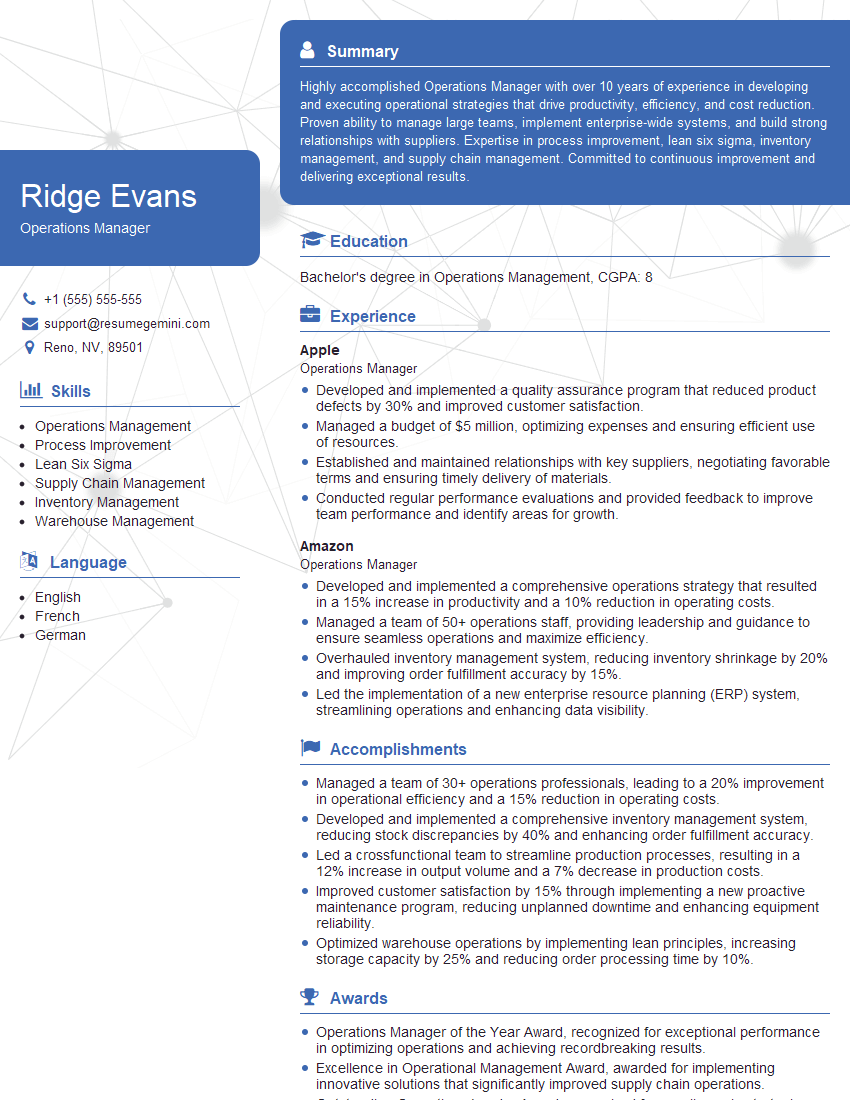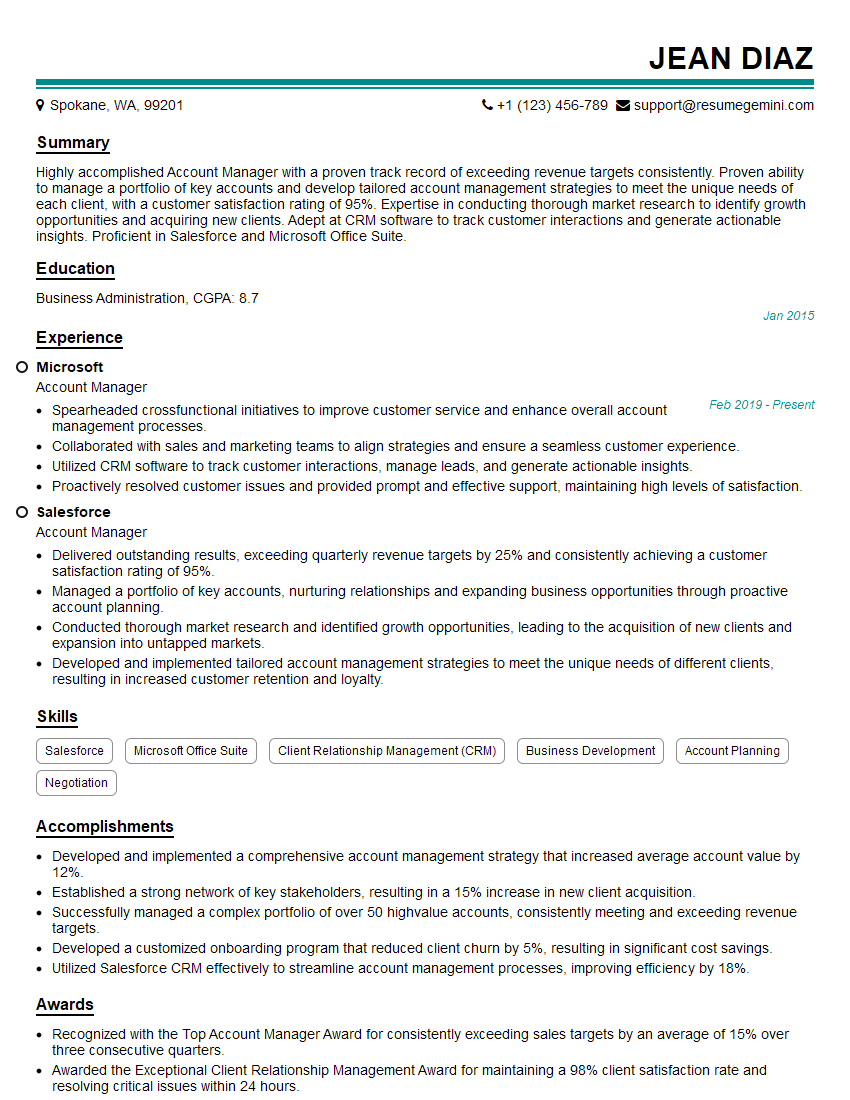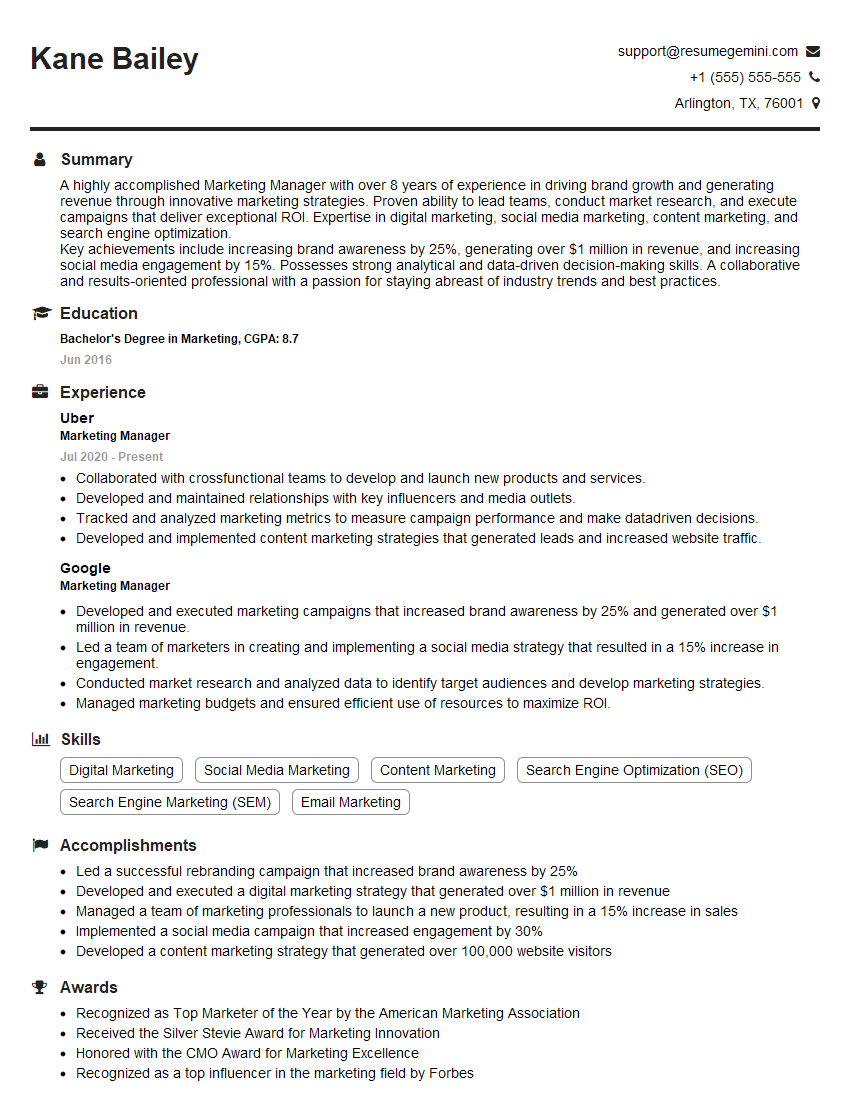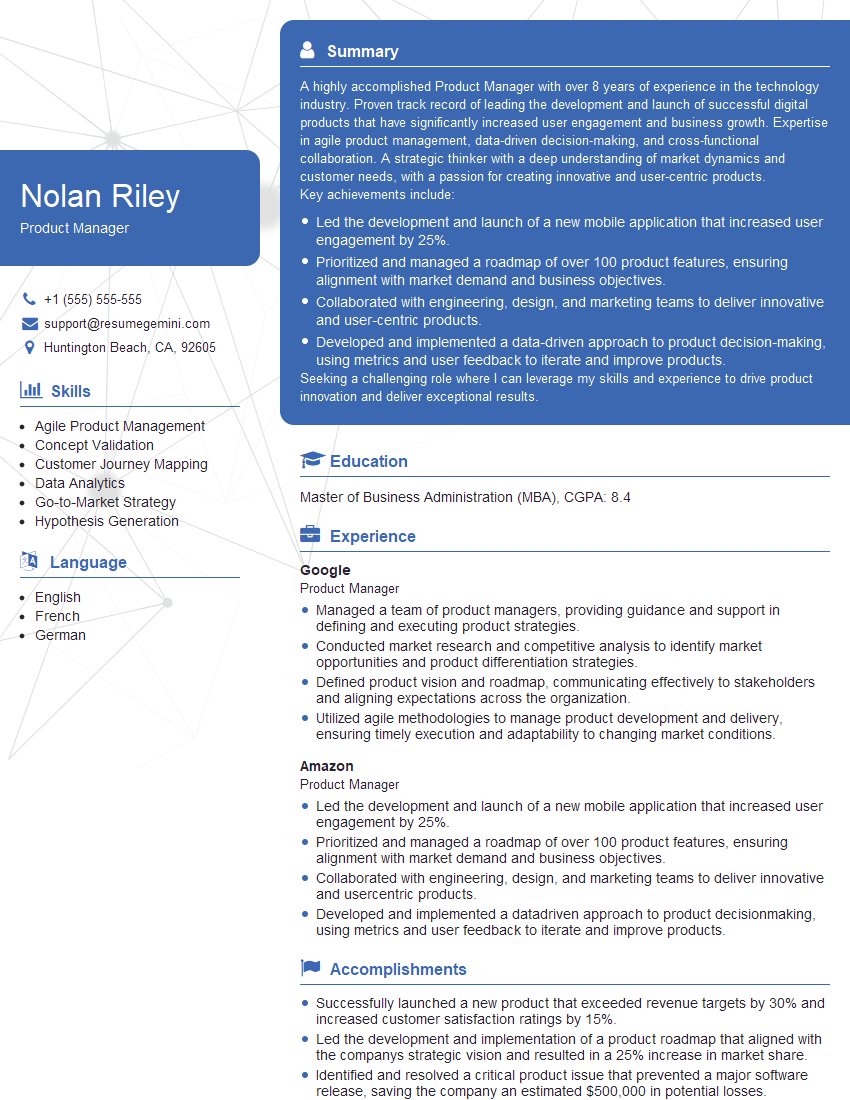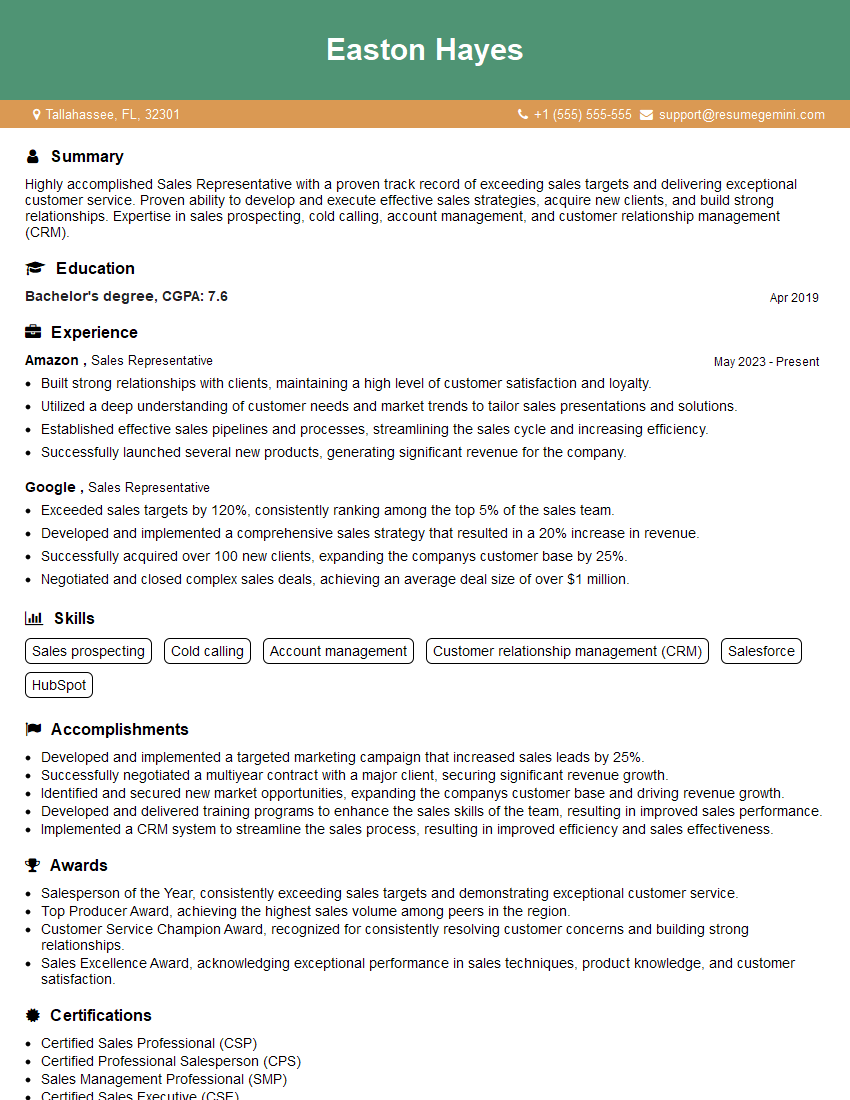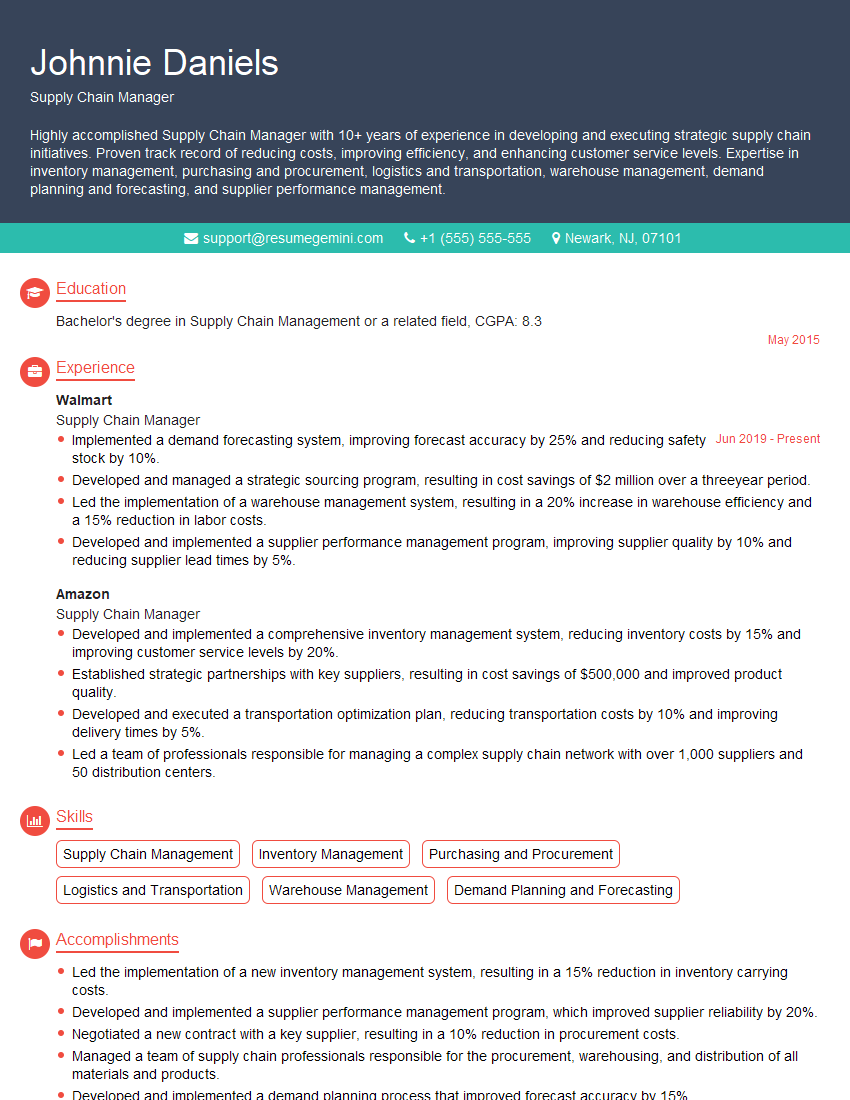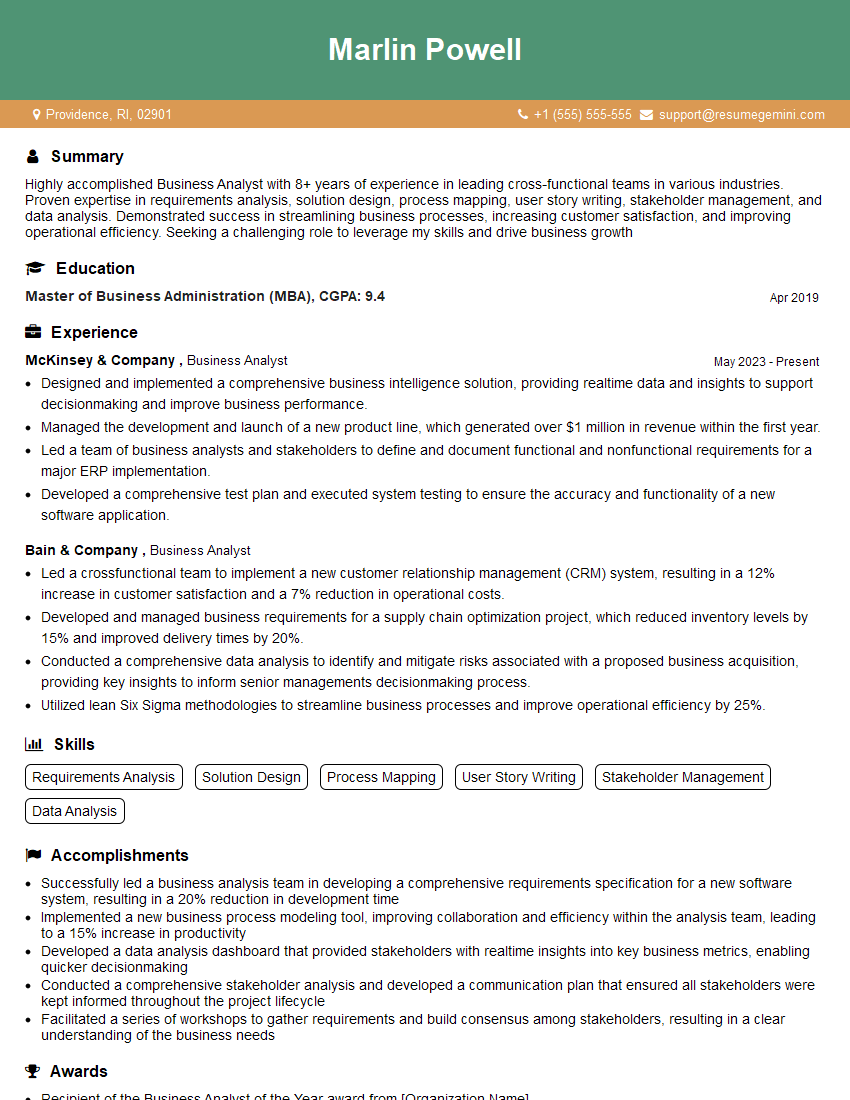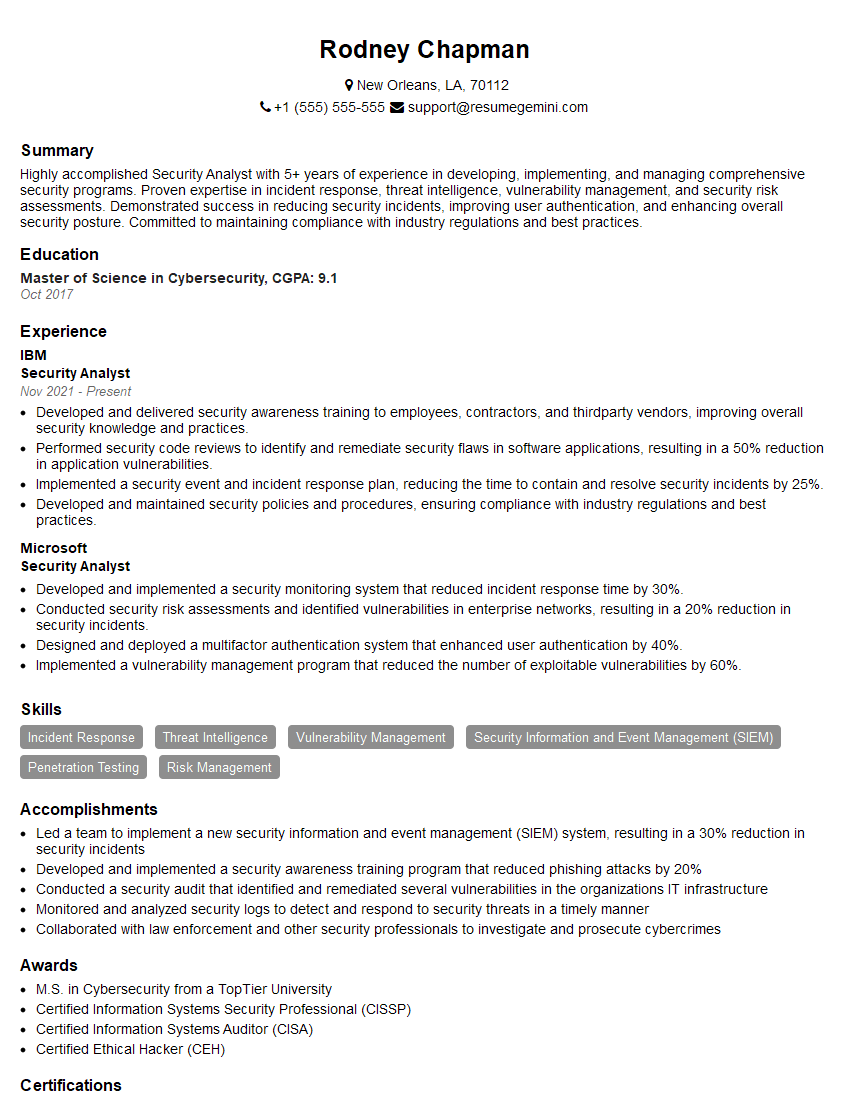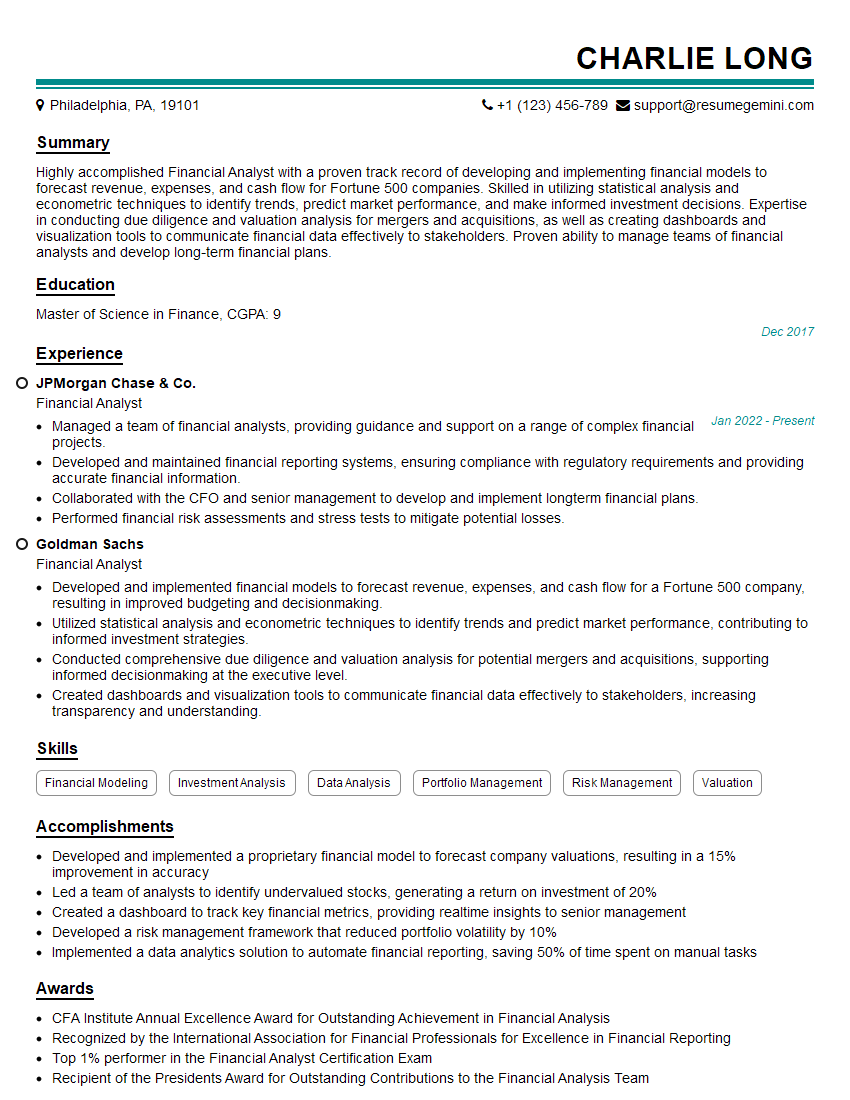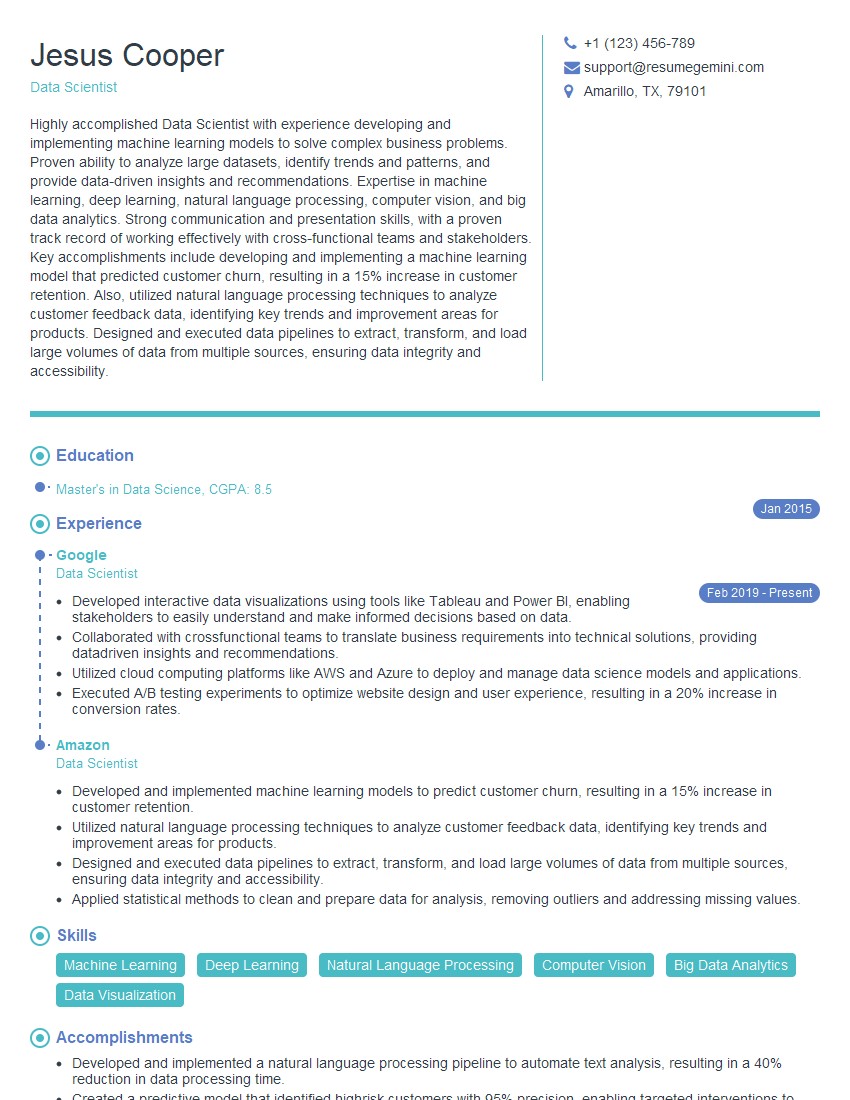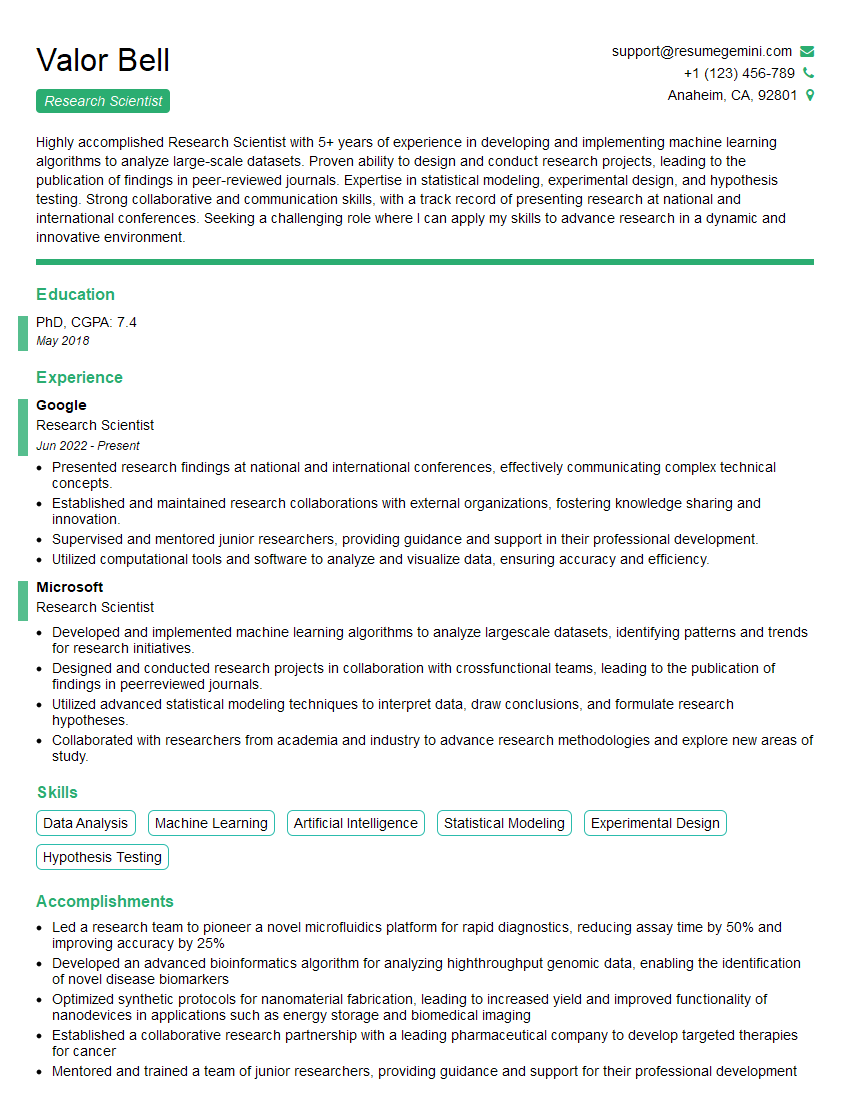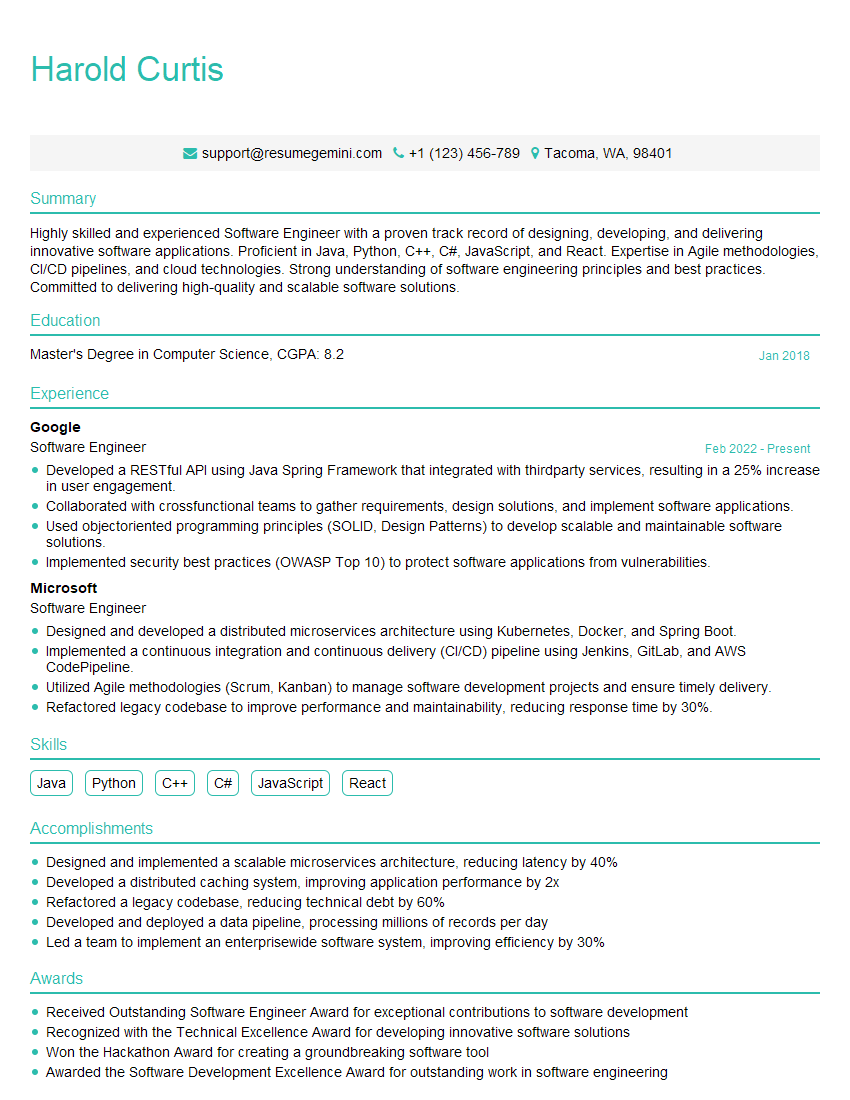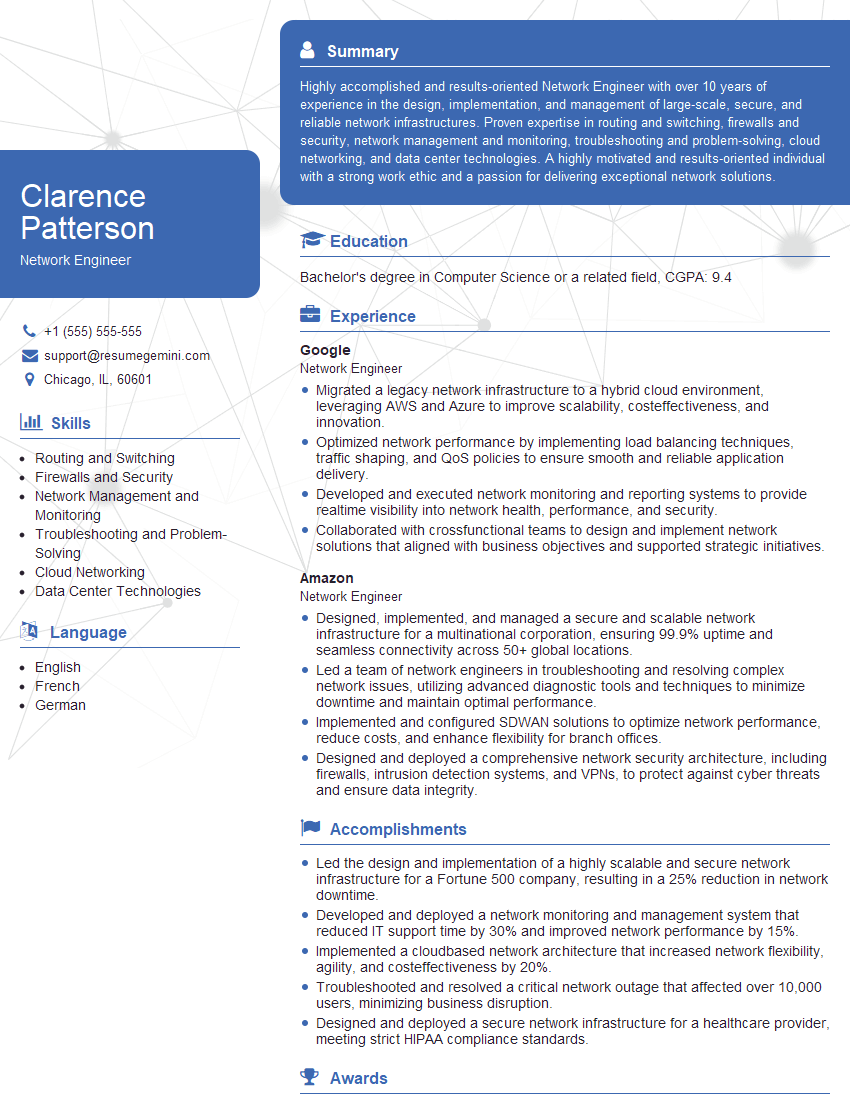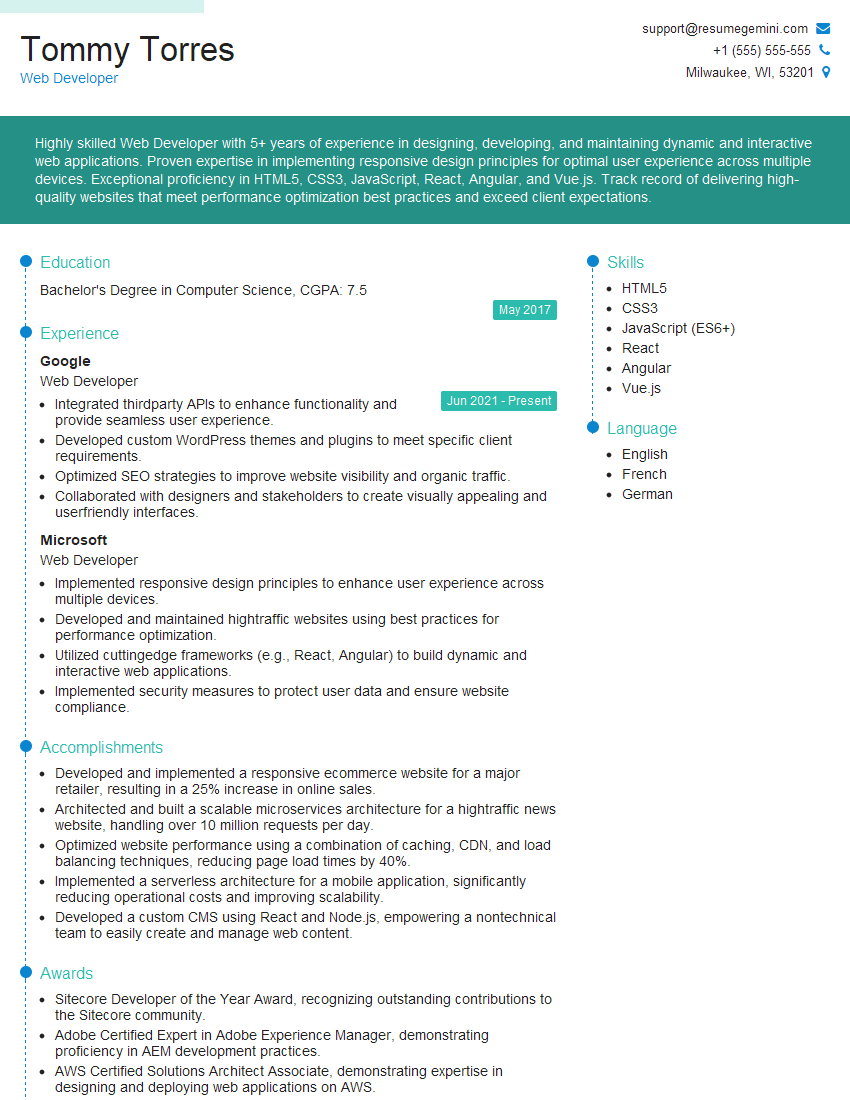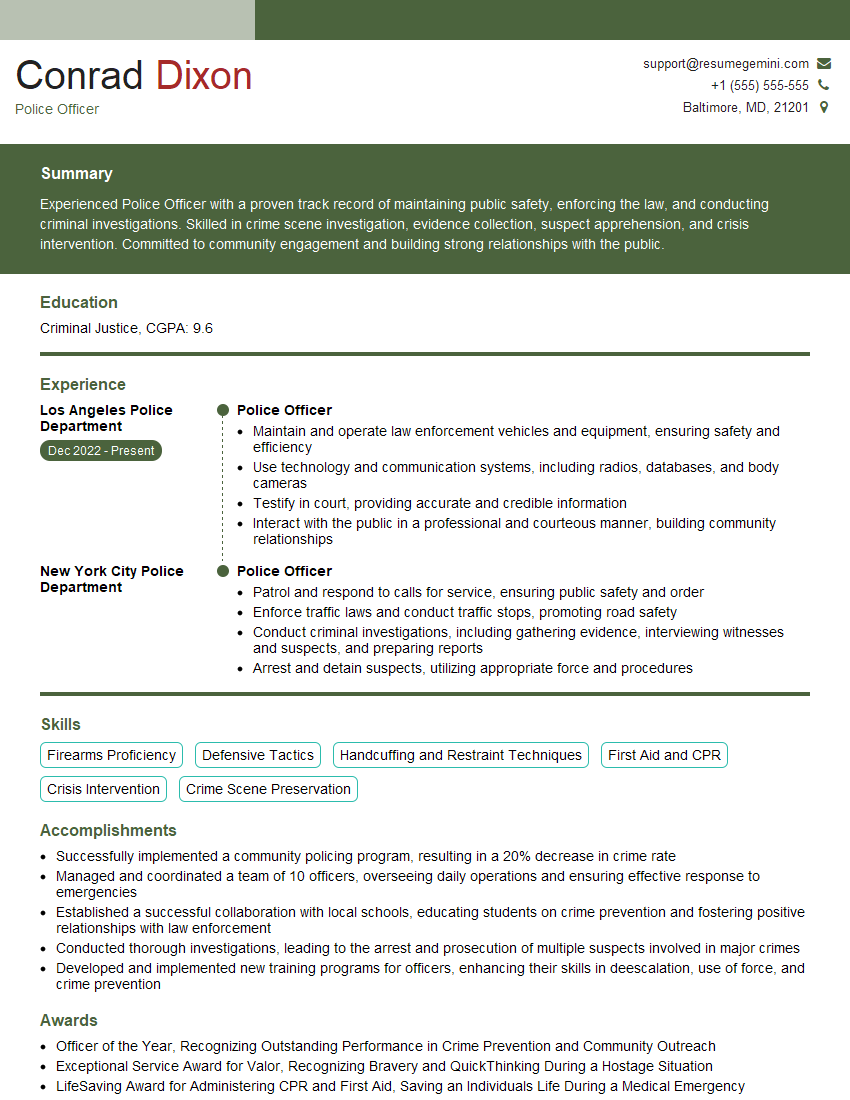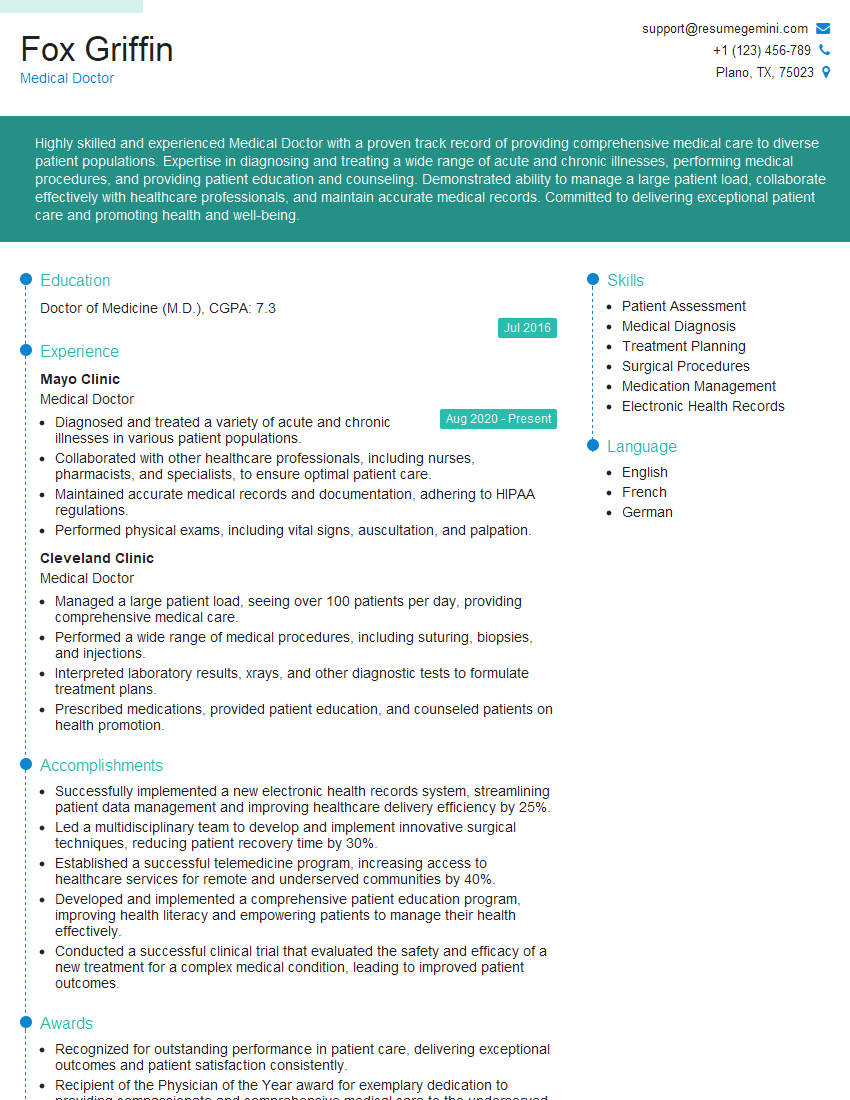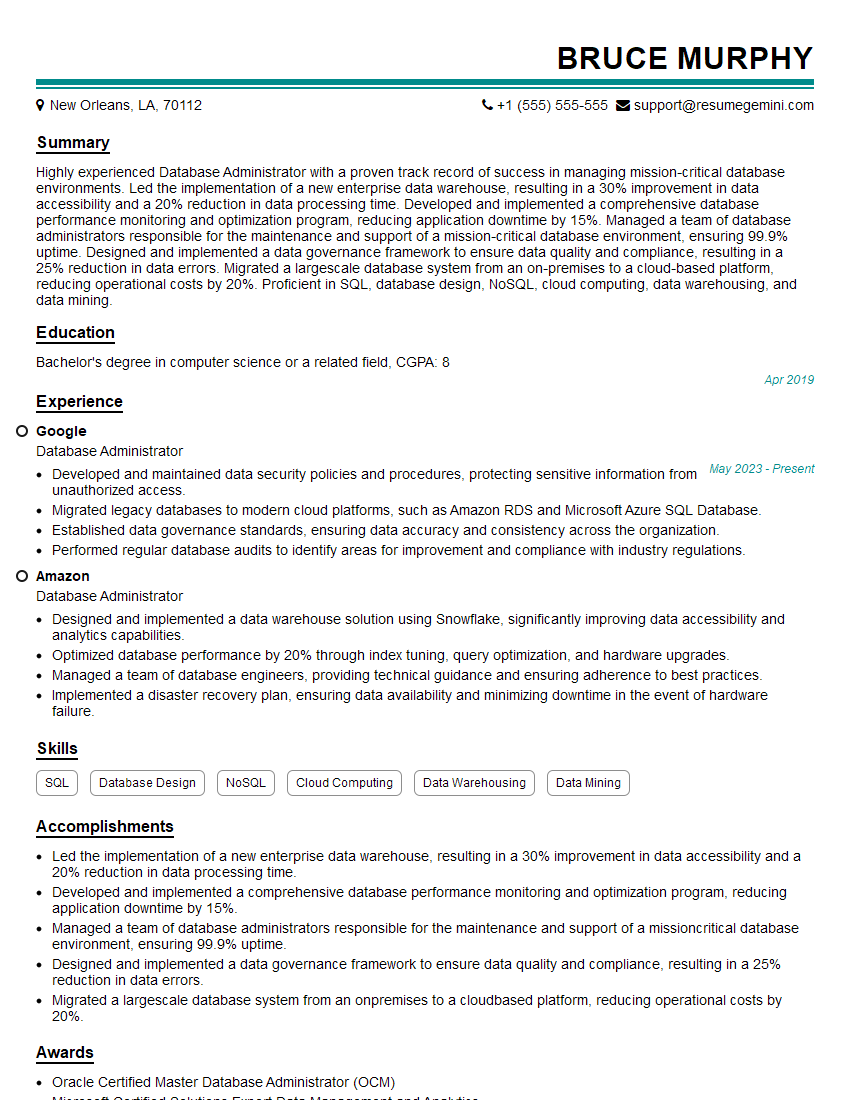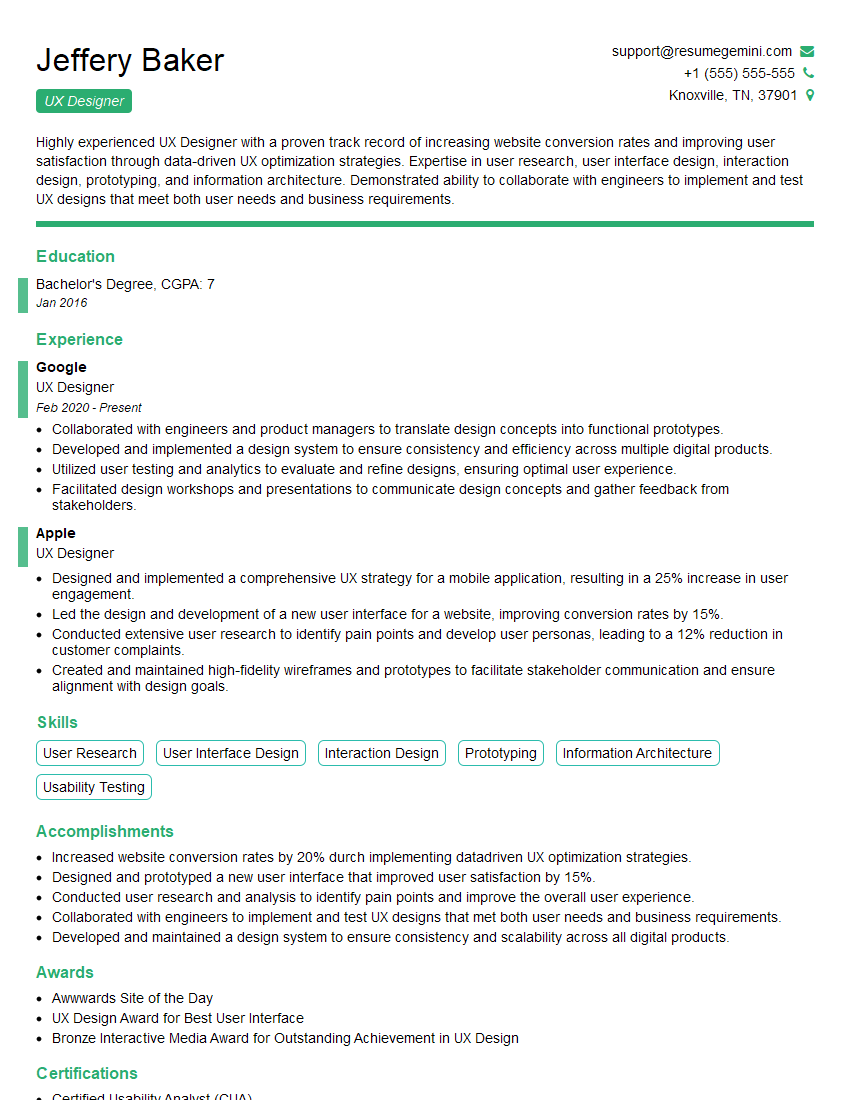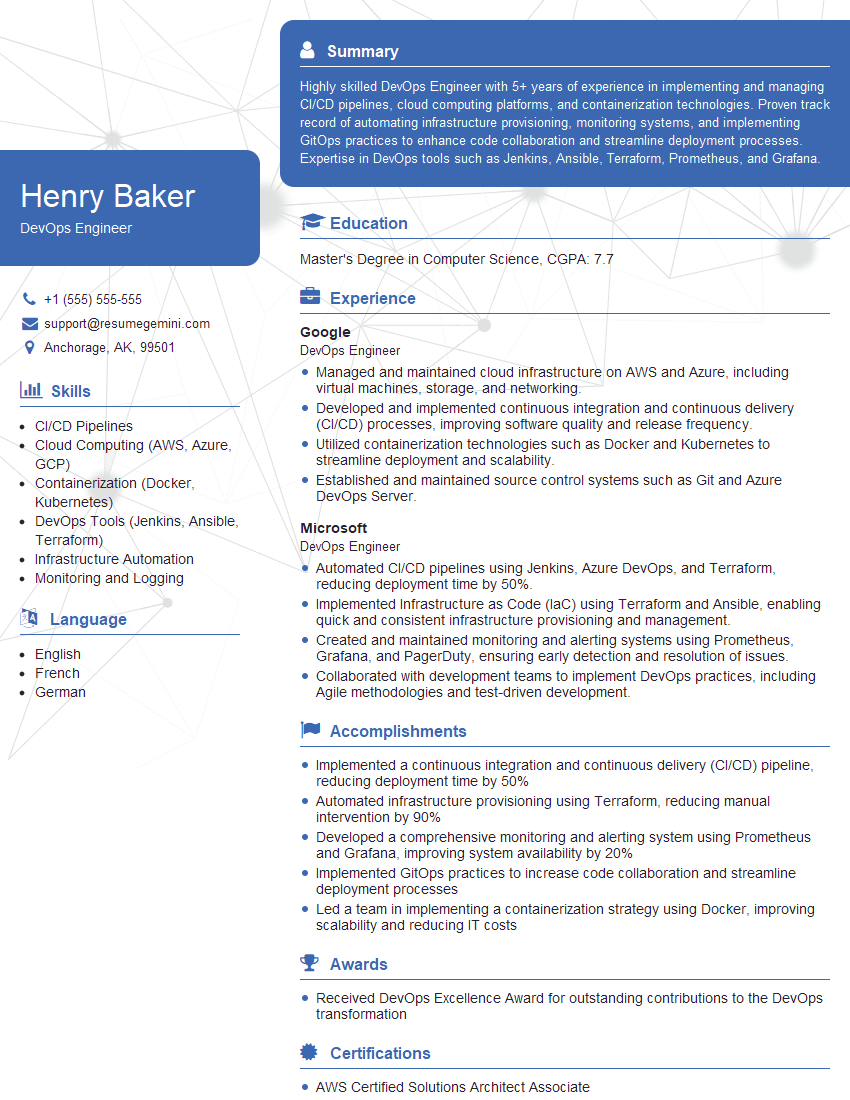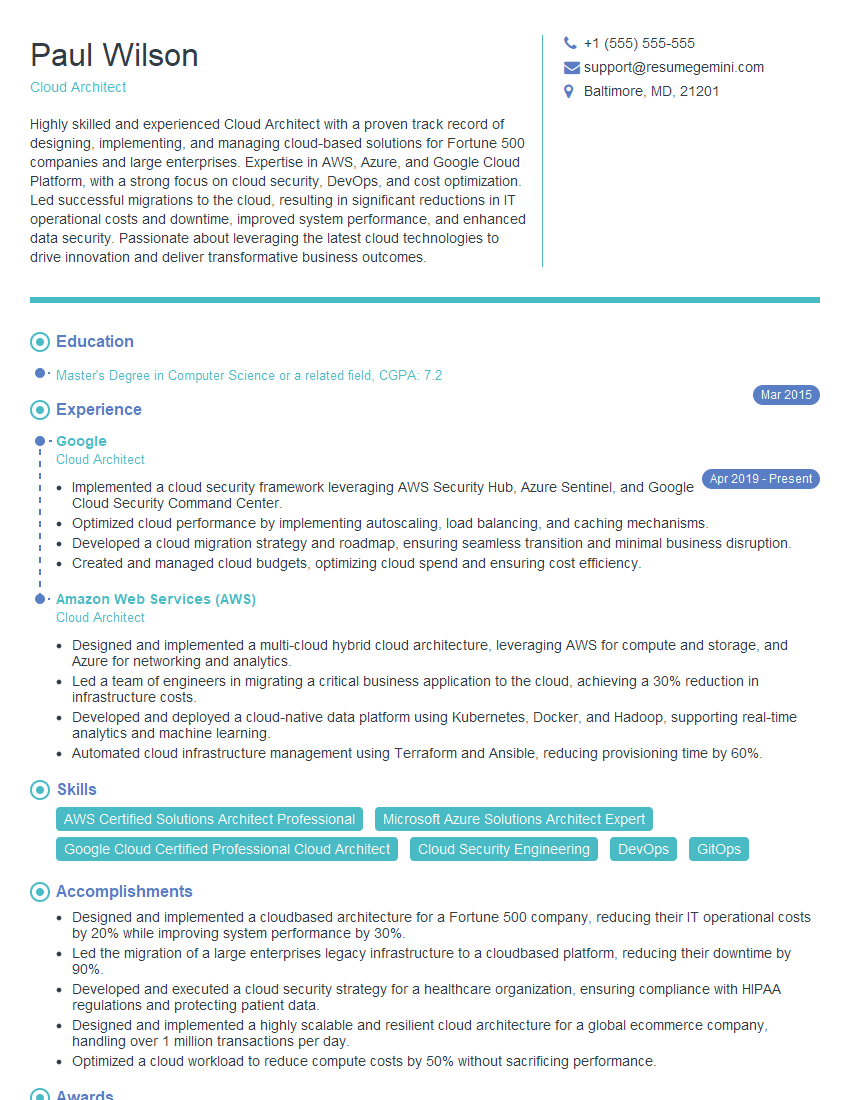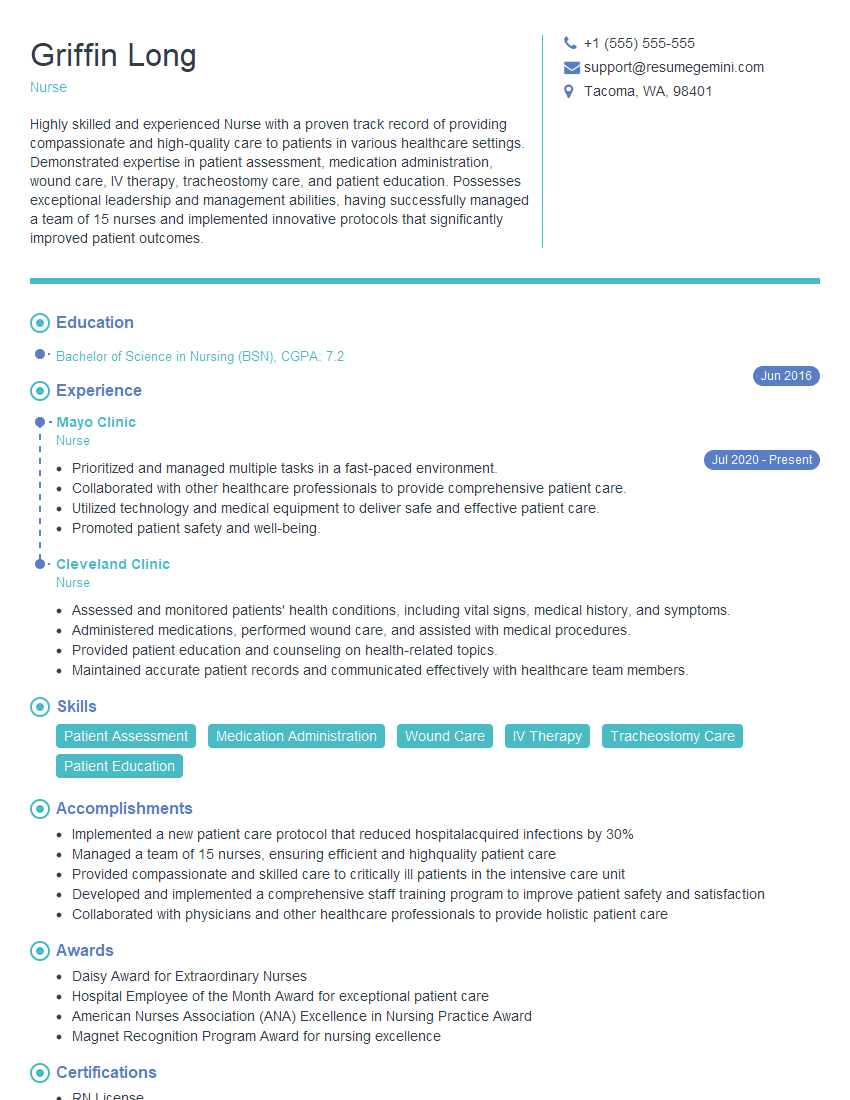Are you ready to stand out in your next interview? Understanding and preparing for Worked extended hours when necessary interview questions is a game-changer. In this blog, we’ve compiled key questions and expert advice to help you showcase your skills with confidence and precision. Let’s get started on your journey to acing the interview.
Questions Asked in Worked extended hours when necessary Interview
Q 1. Describe a situation where you had to work extended hours to meet a deadline. What was the outcome?
During a critical product launch, we faced a significant bug just 48 hours before the deadline. The entire team, including myself, worked extended hours – often until 2 or 3 AM – to identify and resolve the issue. We employed a triage system, prioritizing fixes based on their impact on the core functionality. The outcome was successful; we launched on time, minimizing the impact of the bug. The experience highlighted the importance of collaborative problem-solving under pressure and the power of a dedicated team.
Q 2. How do you prioritize tasks when facing a tight deadline and extended work hours?
Prioritizing under tight deadlines requires a clear understanding of task dependencies and impact. I use the Eisenhower Matrix (urgent/important) to categorize tasks. Urgent and important tasks get immediate attention. Important but not urgent tasks are scheduled. Urgent but not important tasks are delegated if possible, or quickly addressed. Finally, tasks that are neither urgent nor important are eliminated or postponed. This framework allows me to focus my energy on the most critical aspects of the project, even during extended work hours.
Q 3. What strategies do you use to maintain productivity during extended work hours?
Maintaining productivity during extended hours necessitates mindful strategies. These include:
- Strategic breaks: Short, regular breaks every hour are crucial for preventing burnout. A quick walk or a few minutes of stretching can significantly improve focus.
- Time blocking: Dedicate specific time blocks to particular tasks to maintain concentration and avoid multitasking.
- Healthy habits: Staying hydrated, eating nutritious snacks, and getting enough sleep (even if it means adjusting sleep schedule temporarily) are essential.
- Effective task management: Utilizing tools like project management software helps to visualize progress, break down large tasks into smaller manageable steps, and track time spent.
Think of it like marathon running – pacing and strategic rests are key to finishing strong.
Q 4. How do you manage stress and burnout when regularly working extended hours?
Managing stress and burnout when working extended hours is crucial for long-term well-being. I incorporate several strategies:
- Mindfulness and meditation: Even 5-10 minutes of mindfulness can significantly reduce stress levels.
- Regular exercise: Physical activity helps release endorphins, reducing stress and improving mood.
- Healthy boundaries: While dedicated work is important, it’s essential to disconnect completely at the end of the workday to prevent burnout. This includes turning off work notifications and avoiding checking emails.
- Open communication: Talking to my supervisor or colleagues about workload and stress levels can help facilitate support and find solutions.
- Hobbies and relaxation: Engaging in activities outside of work helps to recharge and maintain a healthy work-life balance.
Q 5. Have you ever had to make trade-offs between work and personal life due to extended hours? How did you handle it?
Extended hours have occasionally impacted my personal life. During a particularly intense project, I missed several family dinners and social events. To mitigate this, I proactively communicated my schedule to my family and friends, ensuring transparency and understanding. We found alternative times to connect, like weekend brunch instead of a weeknight dinner. Open communication and adjusting personal schedules where possible were key to maintaining important relationships while meeting professional deadlines.
Q 6. Describe a time you had to work extended hours without additional compensation. Why did you choose to do so?
I once worked extended hours without additional compensation during a company crisis. A major system failure threatened our operations, and I felt a strong sense of responsibility to help resolve it quickly. The team was working tirelessly, and contributing my skills felt crucial to mitigating the damage and getting our systems back online. The sense of collective achievement and the relief of successfully averting a bigger problem were rewarding in themselves.
Q 7. What are your expectations regarding compensation or other benefits for working extended hours?
My expectations regarding compensation for extended hours are reasonable and fair. While I understand that occasional extended work is part of many roles, consistent or excessive overtime requires appropriate compensation or compensatory time off. This is not just about financial reward but about acknowledging the extra effort and potential impact on work-life balance. A clear and transparent policy on overtime is essential for employee morale and retention.
Q 8. How do you ensure accuracy and quality of your work when under pressure and working long hours?
Maintaining accuracy and quality under pressure requires a structured approach. It’s not about working faster, but working smarter. My strategy involves prioritizing tasks, utilizing checklists, and implementing rigorous self-checks. For example, if I’m working on a complex data analysis project with a tight deadline, I’ll first break down the project into smaller, manageable chunks. Each chunk will have its own checklist ensuring all necessary steps are completed. After completing each chunk, I’ll perform a thorough self-review, comparing my results against expected outcomes or established benchmarks. This meticulous process, even under pressure, minimizes errors and guarantees high-quality results. I also believe in the power of taking short, strategic breaks to refresh my focus and prevent burnout, which can significantly impact accuracy.
Another crucial element is leveraging available tools and technologies. Automated checks, version control systems, and peer reviews all contribute to catching errors early and ensuring consistency. Finally, understanding my own limitations and knowing when to seek assistance is critical. Asking for help isn’t a sign of weakness but a demonstration of responsibility and commitment to quality.
Q 9. How do you effectively communicate with your team when working extended hours?
Effective communication during extended hours relies on clear, concise, and frequent updates. I advocate for using a combination of tools to ensure everyone is informed. For instance, regular short team stand-up meetings (even virtual ones) at the start and end of extended work sessions are essential. These allow for quick progress reports, identification of roadblocks, and immediate problem-solving. I also use project management software that enables real-time updates, task assignments, and file sharing, eliminating confusion and promoting transparency. Finally, I prioritize proactive communication; I inform my team in advance if I anticipate needing to work extended hours and outline how this will impact our workflow and communication channels. This avoids unnecessary anxieties and keeps everyone aligned.
Q 10. How do you balance teamwork and individual contributions when working extended hours on a team project?
Balancing teamwork and individual contributions during extended hours hinges on effective delegation and collaborative strategies. It’s crucial to understand individual strengths and weaknesses within the team and assign tasks accordingly. For example, if one team member is more proficient in data analysis, I’ll delegate that aspect while I focus on another area where I have more expertise. Regular check-ins, whether through brief online chats or quick in-person meetings, help maintain momentum and address any emerging issues promptly. Open communication is paramount; I encourage team members to share their workload capacity and any concerns they might have, promoting a collaborative environment where everyone feels supported and can contribute effectively. We might even collaboratively decide to work in shifts, ensuring we’re not all pushing ourselves to exhaustion simultaneously.
Q 11. What are your limits regarding extended work hours? Are there any circumstances where you would refuse to work overtime?
While I am committed to delivering high-quality work, I recognize the importance of maintaining a healthy work-life balance. My personal limit on extended work hours is generally 10 hours a day, not exceeding that for more than two consecutive days. I would refuse to work overtime if it compromises my health, safety, or if I feel that the task at hand is unrealistic or unsafe given the time constraints. Similarly, if the request to work overtime lacks sufficient prior notice or clear justification, I would have a frank discussion about the expectations and workload. Open and honest communication regarding my limits ensures sustainable productivity and overall well-being.
Q 12. Describe a time your extended work hours had a negative impact. How did you address it?
During a particularly intense project launch, I worked excessively long hours for several weeks straight. The negative impact was significant – I experienced burnout, leading to reduced productivity and increased errors. I also neglected my personal life, impacting my overall well-being. To address this, I implemented several changes. Firstly, I prioritized self-care, including regular exercise, sufficient sleep, and a healthier diet. I also scheduled regular breaks throughout the day and learned to say no to non-essential tasks. I communicated openly with my manager and team about my situation, seeking support and re-evaluating the project timeline and workload distribution. The result was a more sustainable approach to completing the project, with improved overall quality and a healthier work-life balance.
Q 13. How do you proactively prevent the need for excessive overtime?
Proactive prevention of excessive overtime involves meticulous planning, effective time management, and realistic expectations. This starts with thorough project scoping and realistic timeline estimations. I utilize project management tools to accurately assess the time required for each task. I also focus on optimizing workflows, identifying and eliminating unnecessary steps or bottlenecks. Moreover, I regularly communicate with stakeholders to proactively manage expectations and address potential delays early on. By communicating potential roadblocks and seeking help when needed, I can prevent smaller issues from escalating into major time sinks. This proactive approach, along with continuous evaluation and adjustment of my workflow, prevents situations where excessive overtime becomes necessary.
Q 14. What tools or techniques do you use to manage your time effectively during extended work periods?
I employ a combination of tools and techniques to effectively manage time during extended work periods. These include prioritizing tasks using methods like the Eisenhower Matrix (urgent/important), utilizing time-blocking techniques to allocate specific time slots for particular tasks, and leveraging project management software to track progress, deadlines, and dependencies. The Pomodoro Technique, involving focused work intervals followed by short breaks, helps maintain concentration and prevent burnout. I also regularly review my schedule and adjust my approach based on progress and unexpected delays. Finally, I avoid multitasking, focusing on one task at a time for better efficiency and improved concentration. This focused approach allows me to maximize my productivity even during extended work hours.
Q 15. How do you delegate tasks when facing a tight deadline and need to work extended hours?
Effective delegation is crucial when facing tight deadlines. It’s not about dumping work; it’s about strategically assigning tasks based on team members’ strengths and capacity. My approach involves a clear understanding of the overall project goals and breaking it down into manageable, well-defined tasks.
- Prioritize tasks: I identify the most critical tasks that absolutely must be completed and assign those to individuals with the relevant expertise.
- Assess team capabilities: I carefully consider each team member’s skills and workload before assigning tasks. I avoid overloading anyone.
- Provide clear instructions: Each task receives clear instructions, including deadlines, expected deliverables, and any relevant resources.
- Establish communication channels: I ensure open communication channels so everyone can ask questions, share updates, and address any roadblocks. Regular check-ins are vital.
For instance, during a recent product launch, I delegated data analysis to a colleague with strong analytical skills while I focused on coordinating with the marketing team. This division of labor allowed us to meet the tight deadline effectively.
Career Expert Tips:
- Ace those interviews! Prepare effectively by reviewing the Top 50 Most Common Interview Questions on ResumeGemini.
- Navigate your job search with confidence! Explore a wide range of Career Tips on ResumeGemini. Learn about common challenges and recommendations to overcome them.
- Craft the perfect resume! Master the Art of Resume Writing with ResumeGemini’s guide. Showcase your unique qualifications and achievements effectively.
- Don’t miss out on holiday savings! Build your dream resume with ResumeGemini’s ATS optimized templates.
Q 16. How do you maintain your physical and mental well-being when working extended hours?
Maintaining well-being during extended work hours requires a conscious and proactive approach. It’s about creating a sustainable rhythm rather than burning out.
- Prioritize sleep: While difficult, aiming for sufficient sleep (7-8 hours) is paramount. Even short power naps can be beneficial.
- Regular breaks: Stepping away from work for short breaks throughout the day is crucial. I often use this time for short walks or stretching exercises.
- Hydration and nutrition: Maintaining proper hydration and consuming healthy snacks prevents energy crashes. I make sure to have healthy options available.
- Mindfulness and relaxation: Incorporating short mindfulness exercises or relaxation techniques (deep breathing, meditation) can help manage stress levels. Even 5-10 minutes can make a difference.
- Boundary setting: It’s vital to set boundaries between work and personal life, even when working extended hours. This might involve designating specific workspaces and ending work at a defined time, even if tasks remain.
I find that scheduling regular exercise, even if it’s just a short session, helps significantly. It’s a great stress reliever and energy booster.
Q 17. What are your preferred methods for staying focused and energized during long workdays?
Staying focused and energized during long workdays is a skill honed over time. It’s a blend of strategies adapted to individual preferences.
- Time Blocking: I use time blocking to schedule specific tasks within dedicated time slots. This enhances focus and prevents task-switching.
- Prioritization techniques: Using methods like the Eisenhower Matrix (urgent/important) helps me focus on the most impactful tasks first.
- Minimize distractions: I create a dedicated workspace free of interruptions and use website blockers or notification silencers when needed.
- Regular movement: Incorporating short walks or stretches every hour helps maintain energy levels and prevent stiffness.
- Strategic breaks: I use breaks strategically, either to step away entirely or to engage in a completely different activity (like listening to music).
I find that working in short, focused bursts (Pomodoro Technique) with short breaks in between enhances my productivity significantly, preventing burnout.
Q 18. Describe a situation where you had to make a difficult decision due to time constraints and extended work hours.
During a software release, a critical bug was discovered very close to the deadline. Fixing it directly would have risked missing the launch window. The team was exhausted after many extended hours.
The difficult decision involved choosing between a complete, slightly delayed release, or a launch with a known minor bug that could be addressed in a patch. I weighed the impact of each outcome: a small bug affecting a limited user base versus a missed launch date affecting overall market strategy and user expectations. After careful analysis of the risks and consulting with senior stakeholders, we opted for the slightly delayed release with the bug completely fixed. Transparency with our users regarding the minor delay and its cause was critical. The outcome proved positive as it improved user trust and product quality far exceeding the minimal launch date delay.
Q 19. How do you handle conflict resolution when working under pressure and extended hours?
Conflict resolution under pressure requires a calm, structured approach. It’s about addressing the issue, not the personalities involved.
- Active listening: I focus on understanding each party’s perspective, even during stressful situations.
- Empathy: I try to empathize with the challenges each individual faces, acknowledging their feelings and concerns.
- Focus on solutions: I shift the conversation towards finding solutions rather than dwelling on the problem. This might involve brainstorming as a team.
- Mediation: If necessary, I facilitate a discussion, guiding the individuals towards a mutually acceptable solution. I might suggest compromises or alternative approaches.
- Documentation: I ensure all agreements and solutions are documented clearly to avoid future misunderstandings.
In a past project, a disagreement arose about the implementation strategy between two team members. By actively listening, understanding their differing priorities and collaboratively brainstorming solutions, we successfully created a compromise that satisfied both parties and met the deadline.
Q 20. Describe your experience working in a fast-paced environment requiring frequent extended hours.
I have extensive experience working in fast-paced environments demanding frequent extended hours. My experience in project management and software development exposed me to high-pressure situations, particularly during product launches and critical bug fixes.
These experiences taught me the importance of prioritization, clear communication, and strategic delegation. I learned to manage my time effectively, to anticipate potential problems and to effectively manage stress. The ability to stay calm, decisive, and collaborative under pressure became crucial. Working efficiently in such environments requires building strong relationships with the team members. Having a supportive and collaborative work environment where everyone understands the high-pressure situations and works collaboratively is essential.
Q 21. How do you measure the success of your work when completed under pressure and extended hours?
Measuring success under pressure involves several factors that go beyond simply meeting the deadline.
- Completion of deliverables: Did we successfully deliver all required features or updates on time?
- Quality of work: Was the delivered work of high quality, meeting the pre-defined standards and client expectations?
- Client satisfaction: Did the client express satisfaction with the deliverables and the entire process? Did we meet the client’s needs?
- Team effectiveness: Did the team function cohesively and productively under pressure?
- Process improvement: Did this project reveal any areas for process improvement to mitigate future pressure situations?
For example, successful completion of a software launch under intense pressure isn’t only judged by on-time launch but also by post-launch reviews, user feedback, and analysis of system stability. A successful launch has high user satisfaction and low reported issues. The overall success extends to the learning we can extract from the process.
Q 22. How have you adapted your work style to handle the demands of extended work hours?
Adapting to extended work hours requires a strategic approach focusing on efficiency and sustainability. It’s not just about working longer, but working smarter. My strategy involves:
- Prioritization: I use techniques like the Eisenhower Matrix (urgent/important) to focus on high-impact tasks during peak performance times. This prevents wasting energy on less crucial activities when fatigue sets in.
- Time Blocking: I schedule specific blocks of time for focused work on particular tasks, minimizing context switching and maximizing concentration. This is crucial for maintaining productivity during longer hours.
- Regular Breaks: Short, frequent breaks are essential. I aim for a 5-10 minute break every hour to rest my eyes, stretch, and re-energize. This prevents burnout and maintains focus.
- Delegation: When possible, I delegate tasks to others to alleviate my workload and distribute the effort. This is crucial for team cohesion and avoiding overburdening myself.
By combining these strategies, I ensure that extended hours are productive and don’t compromise the quality of my work or my overall well-being.
Q 23. Describe a time when you had to learn a new skill quickly to meet a deadline that required extended hours.
During a critical project launch, we needed to integrate a new payment gateway within a very tight deadline, requiring many extended hours. While proficient in the existing system, I lacked experience with this specific gateway’s API. I immediately:
- Accessed the Gateway’s Documentation: I thoroughly reviewed their API documentation, focusing on key integration points and troubleshooting common issues.
- Used Online Tutorials and Forums: I leveraged online resources like Stack Overflow and YouTube tutorials to understand best practices and address specific challenges.
- Practiced with Test Environments: I set up a test environment to experiment with the API, allowing me to learn through practical application without risking the production system.
By the end of the extended work period, I had successfully integrated the new gateway, demonstrating rapid learning and problem-solving skills under pressure.
Q 24. How do you plan your work to minimize the need for excessive overtime?
Minimizing excessive overtime requires proactive planning and efficient task management. My approach focuses on:
- Realistic Planning: I meticulously estimate the time required for each task, considering potential challenges and building in buffer time. This reduces the likelihood of unexpected delays and overtime.
- Prioritization and Delegation: As mentioned before, prioritizing tasks ensures I focus on high-impact activities. Delegating tasks where possible distributes workload and optimizes team efficiency.
- Regular Progress Monitoring: I regularly review my progress against deadlines, allowing for timely adjustments if necessary. Early identification of potential roadblocks reduces the chance of having to work excessive overtime to catch up.
- Effective Communication: Open communication with my team and manager about workload and potential challenges allows for proactive problem-solving and resource allocation.
This proactive approach transforms potential overtime into efficient task management, maximizing productivity and minimizing stress.
Q 25. What is your approach to self-care when dealing with consistently long working hours?
Self-care is paramount when dealing with consistently long working hours. Neglecting it leads to burnout and reduced effectiveness. My self-care strategy encompasses:
- Regular Exercise: Even short bursts of physical activity like a quick walk during lunch or a workout in the evening helps reduce stress and improve mood.
- Healthy Diet: I focus on nutritious meals and snacks to maintain energy levels and prevent crashes. Staying hydrated is equally important.
- Sufficient Sleep: Prioritizing sleep is essential for physical and mental recovery. I aim for 7-8 hours of quality sleep each night.
- Mindfulness and Relaxation Techniques: Practicing mindfulness, meditation, or deep breathing exercises helps manage stress and improve mental clarity.
- Time Off and Disconnection: I schedule regular time off, ensuring complete disconnection from work to recharge and prevent burnout.
These practices are not optional; they are essential components of sustainable long-term performance.
Q 26. How do you anticipate and address potential problems when working extended hours?
Anticipating and addressing potential problems during extended work hours requires a proactive and systematic approach. My strategy includes:
- Risk Assessment: Before starting a long work session, I identify potential challenges and develop contingency plans. This might involve preparing backup resources or identifying alternative solutions.
- Regular Check-ins: I schedule regular check-ins with team members to monitor progress and address any emerging issues proactively. This prevents small problems from escalating into major disruptions.
- Clear Communication: Maintaining clear and consistent communication with stakeholders ensures everyone is informed about progress, challenges, and any necessary adjustments. This minimizes misunderstandings and delays.
- Flexibility and Adaptability: I remain flexible and adaptable, adjusting my plans as needed to respond to unforeseen circumstances. This ensures that I can navigate unexpected problems effectively.
By implementing these steps, I create a framework that facilitates efficient problem-solving and minimizes the impact of unforeseen challenges.
Q 27. How do you ensure you are still contributing effectively to team goals even with extended work hours?
Maintaining effective team contributions during extended work hours requires mindful effort and strong communication. My approach focuses on:
- Collaboration: Even when working extended hours, I prioritize collaboration and communication with my team. This ensures everyone is informed and working towards the same goals.
- Clear Updates: I provide regular updates to my team and manager on my progress, challenges, and anticipated timelines. This transparency ensures everyone is aligned and informed.
- Support and Guidance: I actively support and guide my team members, sharing my knowledge and experience to ensure the collective success of the project. This fosters teamwork and collaboration.
- Effective Delegation: When possible, I delegate tasks that do not require my direct expertise. This allows me to focus on high-impact activities while ensuring the team remains engaged and productive.
By prioritizing collaboration and maintaining clear communication, I contribute to team success even during periods of extended work hours.
Q 28. Can you provide an example of how you utilized technology or tools to improve efficiency during extended work hours?
Technology plays a significant role in improving efficiency during extended work hours. For example, I use:
- Project Management Software (e.g., Jira, Asana): This helps to track progress, manage tasks, and ensure alignment with team goals. It also enables efficient task delegation and collaborative workflow.
- Automation Tools (e.g., Zapier, IFTTT): I leverage automation to handle repetitive tasks, freeing up time for more complex activities. This is especially valuable during extended work periods.
- Communication Platforms (e.g., Slack, Microsoft Teams): These tools facilitate rapid communication with team members, ensuring quick responses and problem-solving. They reduce the need for lengthy email chains.
- Note-taking and Collaboration Apps (e.g., Notion, Google Docs): These tools allow for efficient organization of thoughts, ideas, and progress updates, enhancing collaboration and minimizing information loss.
By integrating these technologies, I optimize my workflow, reducing wasted time and improving overall productivity, even when working extended hours.
Key Topics to Learn for “Worked Extended Hours When Necessary” Interview
- Understanding the Context: Explore the various reasons why extended hours might be required in a role. Consider situations demanding extra effort, deadlines, and project urgency. Think about different types of projects and how they might necessitate extra time.
- Prioritizing Tasks and Time Management: Discuss strategies for effective time management and task prioritization when facing tight deadlines and extended work hours. Highlight your ability to manage multiple priorities effectively under pressure.
- Communication and Collaboration: Explain how you communicate your workload and potential need for extended hours to supervisors and team members. Showcase your proactive approach to managing expectations and ensuring smooth team collaboration.
- Maintaining Work-Life Balance (While Addressing Extended Hours): Discuss your strategies for maintaining a healthy work-life balance while occasionally working extended hours. Emphasize your commitment to both professional excellence and personal well-being. This shows maturity and responsibility.
- Resilience and Adaptability: Demonstrate your ability to adapt to changing demands and remain productive even during periods of increased workload and extended hours. Highlight examples of your resilience in overcoming challenges.
- Problem-Solving Under Pressure: Discuss how you approach problem-solving when facing time constraints and pressure. Highlight your ability to remain calm, focused, and effective under pressure.
Next Steps
Mastering the art of effectively communicating your experience with “working extended hours when necessary” is crucial for career advancement. It showcases your dedication, commitment, and problem-solving skills – qualities highly valued by employers. To increase your job prospects, crafting an ATS-friendly resume is essential. ResumeGemini is a trusted resource that can help you build a professional resume that highlights your relevant skills and experience. Examples of resumes tailored to showcase experience with “working extended hours when necessary” are available, ensuring your application stands out.
Explore more articles
Users Rating of Our Blogs
Share Your Experience
We value your feedback! Please rate our content and share your thoughts (optional).
What Readers Say About Our Blog
Hi, I have something for you and recorded a quick Loom video to show the kind of value I can bring to you.
Even if we don’t work together, I’m confident you’ll take away something valuable and learn a few new ideas.
Here’s the link: https://bit.ly/loom-video-daniel
Would love your thoughts after watching!
– Daniel
This was kind of a unique content I found around the specialized skills. Very helpful questions and good detailed answers.
Very Helpful blog, thank you Interviewgemini team.
